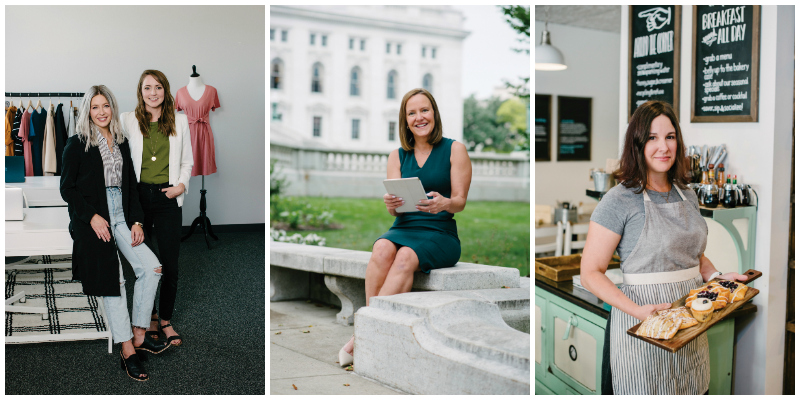TECH RECRUITER. CLOTHIERS. RESTAURANTEUR.
Annemarie Maitri, Amy Arenz, Krystle Marks and Abby Felix Winzenried launched vastly different types of businesses in Madison. But what they all have in common is fierce persistence and a desire to succeed. And, a rejection of the “it’ll never work” mentality they faced as they got their companies off the ground. They are all a lesson in, as Marks puts it, pushing through the fear.
Concero Recruits on Demand
By Candice Wagener
Amy Arenz didn’t initially plan to build a career in the software industry. But the first position she landed out of college was at a Chicago-area recruiting firm; she admits she had “no idea what it was.”
She dove in to learn the ropes and set her sights on landing Platinum Software as a client, noticing its rapid growth and appealing work environment (“the CEO had a ponytail and there was no dress code.”)
In 1995, Platinum hired Arenz as a recruiter, the first step in her journey to founder and CEO of Concero, a firm highly specialized in recruiting people for the extremely competitive field of software sales. Headquartered in Madison, Concero is the 18th fastest-growing company in Wisconsin. It made the Inc. 5000 list for nationally fastest growing companies two years in a row, with revenue topping $3 million, 50 employees and two additional offices in Chicago and Oakland, California.
After returning to Madison, Arenz founded Concero in 2010 to bring together her expertise and expansive network she had gained, as well as offer a new type of service in the industry.
Concero’s model of recruitment on demand—companies sign up for a month-to-month subscription for a minimum of three months—gives needed support during crunch times but doesn’t pose a financial hit during slower times. Because the software industry is extremely competitive and requires specialized knowledge, Concero is often recruiting employees “active in the passive market,” meaning they are recruiting people who aren’t even job hunting into a new position within four weeks.
Arenz has always been a highly-skilled people person, according to Fred Zaeske, former vice president of recruiting at Platinum Software and Arenz’s first supervisor. “Amy is very focused, very analytical, excellent with people both in person and over the phone, and understands the types of people that people want,” says Zaeske. “She gets good people that get hired.”
As any good company in the tech sector should, Concero strives to be innovative in its business operations. It recently launched text messaging as a tool to streamline the hiring process, useful in the scheduling component for interviews as one example. “We’ve found with technology and, especially, recruiting the younger generation that relies heavily on their phone, in order to keep [the recruiting process] mov- ing, that text component was crucial,” says Arenz.
This fall, Concero will add software development recruiting into the mix. With so many startups developing products before they command a full-blown sales and marketing team, Arenz sees a need Concero can fill.
Arenz says many questioned her decision to base a tech company in Madison. At the time, she admits, Epic was really it for tech. But she’s proud of the dominant space her company holds in the industry.
And she sees a wealth of potential for Madison’s tech future. “What I’m excited about is the city’s investment in the technology community; we’re recognized more now as a place for startups and technology. Being here first, it’s exciting to see Madison grow and change…this feels like a good place to be with the business.”
Lev Apparel’s Fair Trade Vow
By Hywania Thompson
Krystle Marks was thriving as a personal stylist when she started to wonder what was next. “I woke up and I felt like there was this brick wall in front of me and I knew it was time to just stop and listen,” she says. What Marks heard in her heart was the idea for Lev Apparel. It was an opportunity for Marks to provide women with modern, sustainable clothing for their body shape, while empowering women across the globe.
In summer 2017, Marks took a sabbatical in which she spent more time praying and meditating about the change. By the end of that summer, the concept for Lev Apparel became clearer. “If we can actually attack the root source of most trafficking situations, which is poverty, lack of opportunities and dignified work, then we can actually make a dent as a company to help eradicate that,” Marks says. The fair-trade brand was conceived.
Abby Felix Winzenried had followed Marks’ journey as a personal stylist. When she found out Marks was branch- ing out, Felix Winzenried knew she had to connect with her. Much like Marks, Felix Winzenried was thinking about her next steps. “I really like the behind the scenes, operations side of things. When I heard about Krystle’s new venture I was like, this is something I could be a part of and use those talents to do something bigger and better,” she says.
Marks and Felix Winzenried design their products, and then they send the designs to Chicago-area pattern maker Xochil Herrera Scheer. They work with Sonica Sarna Design, an artisan group in New Delhi, India, to make the clothes. Herrera Scheer believes what they’re doing will have a big impact. “When you can give someone a skill, she has a means to support herself not just in a single job, but to create a viable career path, and a way to support herself and her family,” Scheer says.
The road to launching Lev Apparel wasn’t entirely smooth. Early on, they found out their initial business name had already been copyrighted so they had to start the naming process all over again. They chose Lev, which is the Hebrew word for heart. “We feel it represents what we stand for as a brand,” Marks says. “Our heart is to celebrate, give hope, restore dignity, bring freedom and empower women worldwide. We do this by creating the ultimate cycle of women empowering women through each Lev Apparel purchase.”
They hit another snag earlier this year after receiving their first samples back from New Delhi. Half of them weren’t correct. It was a challenge, but they kept going. “We decided to invest more time and money into a complete redesign of that dress,” she says.
The design process is difficult and can involve multiple rounds of prototyping, revisions and sometimes redesign, says Herrera Scheer. “Having trust in the process and trust in each other is so important,” she says. “I’m glad to not just work with Lev Apparel, but also to become friends with Krystle and Abby. We relate as business women, entrepreneurs and mothers.”
Marks and Felix Winzenried say starting a business is like mental gymnastics, but it’s rewarding. And there’s resources like the Small Business Administration and Wisconsin Women’s Business Initiative Corporation, to help you navigate. Marks’ advice to other entrepreneurs is to push through the fear. “Don’t let all of the unknowns stop you from starting—needing to know where it’s heading and having all the pieces—just start.”
The Rise of Bloom Bake Shop
By Emily McCluhan
When Annemarie Maitri left the world of sales and marketing in 2010 to open Bloom Bake Shop in Middleton, she didn’t expect lines out the door of her tiny shop. But this Southern girl who grew up immersed in family dinners found her niche putting her baking talents to use.
She admits she didn’t take the easy path when deciding to become an entrepreneur. At the time, Maitri had three small children and the nation was digging out of a recession. She chose to open her shop just three days a week to offer wedding cakes and desserts, all featuring locally-sourced ingredients.
“In the beginning, this decision brought me quite a bit of criticism and skepticism around my commitment. But, I stayed true to my values both for my family as well as my business intentions,” she says.
Through all the long hours trying to balance it all, the only thing she says she would’ve done differently is to be gentler on herself about the hours she put in. She knew she was the one with the vision and needed to be present. As she notes, “In the beginning, one can never underestimate the amount of work it takes to launch a small business.”
Word of mouth propelled Maitri’s wedding cake business at Bloom, but the game-changer was the decision to start making buttermilk biscuit sandwiches for employee meals, and eventually start selling them to her customers. The next thing she knew, there were lines out the door on Saturdays and they were bursting at the seams.
The decision to open a larger location on Monroe Street in 2017 with an expanded menu and space for catering was a natural choice since Maitri lives in the neighborhood. The thought of leaving the Middleton community pulled at her heart strings though and she knew it would be a challenge to keep her family and passion for baking aligned if she kept both locations. “But the voices around me: friends, customers, business advisers, were pushing me to continue. Growth in this fashion is natural. Bloom was a success, why wouldn’t two locations work?” she says.
And it did work. In fact, both locations thrived. Using that success, Maitri decided to shift the focus of the Middleton location to be even more community-driven in 2018. She turned the bake shop into a coffeehouse and bookstore, called Bloom Bindery, with a mission to promote a love of reading. A portion of the profits from cookie sales were donated to local literacy groups, book clubs used the space and families came together to read to each other. But after a few months, Maitri was torn.
“It wasn’t working for me, professionally and especially personally,” she says. “I constantly felt pulled between both shops, I was spending more time in a car going between both locations and less time doing all of the things I was passionate about, creating recipes, working with staff and interacting with customers.”
Although she was pushed by many to delegate more or grow her team, she knew it was the right decision to close the Middleton location in August 2018.
Now, as the Monroe Street location thrives and she has more time for her family, she considers this decision a blessing. It’s allowed her to explore other avenues for getting the brand out there, like the Bloom Bus, which Maitri’s crew uses to partner with Madison Reading Project to bring cookies and donated books to literacy events. The 1974 Volkswagen Bus can also be rented for private events.
“I have learned, as many entrepreneurs learn, you have to push down the path, but you have to be OK with changing course when it is not for the greater good for all involved,” says Maitri.
For her, she emphasizes that the greater good will always house her family, community and the quality of what she and her team bring to the table each day.




Comments are closed.